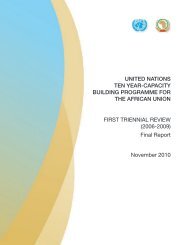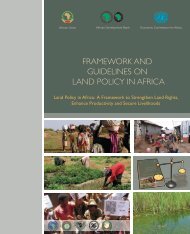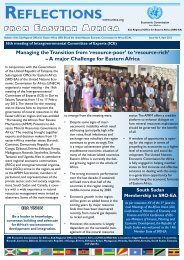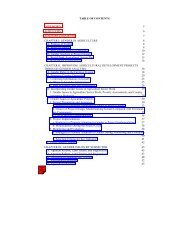A Decade of NEPAD - Economic Commission for Africa - uneca
A Decade of NEPAD - Economic Commission for Africa - uneca
A Decade of NEPAD - Economic Commission for Africa - uneca
You also want an ePaper? Increase the reach of your titles
YUMPU automatically turns print PDFs into web optimized ePapers that Google loves.
high food prices, but with a special focus on conservation<br />
agriculture. This is being used in a joint <strong>NEPAD</strong>-<br />
FAO programme (2008-10) to scale up the adoption <strong>of</strong><br />
conservation agriculture in Southern <strong>Africa</strong>. It aims<br />
to reach 23,700 rural households. Farmers in Lesotho,<br />
Mozambique, Swaziland and Zimbabwe have been<br />
trained and given improved seed varieties and appropriate<br />
technologies such as the jab planter and planting<br />
basin methods. Women and children are key targets<br />
<strong>of</strong> the programme, which in 2010 will be extended to<br />
Eastern <strong>Africa</strong>.<br />
ӹ Water and irrigation: Under Pillar 1, <strong>NEPAD</strong> coordinates,<br />
aligns and manages knowledge initiatives across<br />
the continent. An initiative to address regional constraints<br />
to scaling up investments in irrigation development<br />
was launched. Here <strong>NEPAD</strong> focused on ensuring<br />
that regional resource mobilisation directly supports<br />
country CAADP processes.<br />
Pillar 2 – Market Access<br />
Pillar 2 aims to increase market access through improved<br />
rural infrastructure and other trade-related interventions.<br />
The lead agency under Pillar 2 is the Dakar, Senegal based<br />
Conference <strong>of</strong> Ministers <strong>of</strong> Agriculture <strong>of</strong> West and Central<br />
<strong>Africa</strong> (CMA/WCA):<br />
The objectives <strong>of</strong> Pillar 2 are to:<br />
ӹ Accelerate growth in the agricultural sector by raising<br />
the capacities <strong>of</strong> private entrepreneurs (including<br />
commercial and small-holder farmers) to meet the increasingly<br />
complex quality and logistic requirements <strong>of</strong><br />
markets, focusing on selected agricultural commodities<br />
that <strong>of</strong>fer the potential to raise rural (on- and <strong>of</strong>f-farm)<br />
incomes, and<br />
ӹ Create the required regulatory and policy framework<br />
that would facilitate the emergence <strong>of</strong> regional economic<br />
spaces that would spur the expansion <strong>of</strong> regional trade<br />
and cross country investments<br />
Key objectives <strong>of</strong> the work programme under Pillar 2<br />
include initiatives to:<br />
ӹ Improve local infrastructure so that <strong>Africa</strong>n farmers<br />
have better connections to markets, addressing issues<br />
including:<br />
• transportation, (road, rail, marine and air freight)<br />
• storage, packaging and handling systems<br />
• retail facilities<br />
7. Toward Ownership and Partnership with <strong>NEPAD</strong>: Key Recommendations A <strong>Decade</strong> <strong>of</strong> <strong>NEPAD</strong><br />
• in<strong>for</strong>mation technology, and<br />
• overall supply chains.<br />
ӹ Improve competitiveness through sound trade policies<br />
at the national, regional and continental level.<br />
ӹ Strengthen capacity to participate in trade negotiations<br />
and meet market access requirements <strong>for</strong> world trade<br />
(quality, grades and standards, etc.).<br />
ӹ Strengthen capacities among the agribusiness community<br />
and facilitate business partnerships with importing<br />
companies.<br />
ӹ Build strategic alliances to create industry-to-industry<br />
linkages and expand domestic and <strong>for</strong>eign direct investment<br />
in agriculture<br />
Key initiatives under Pillar 2 to date include the following:<br />
ӹ Framework Development: Work is proceeding on the<br />
Market Access vision and framework simultaneously.<br />
The Secretariat has facilitated and coordinated the final<br />
technical review and validation processes <strong>for</strong> the<br />
CAADP Pillar 2 Framework on increasing market access<br />
through improved infrastructure and trade-related<br />
interventions.<br />
ӹ Fertiliser Programme: Following up on the Abuja Declaration,<br />
<strong>NEPAD</strong> has worked closely with the <strong>Africa</strong>n<br />
Union <strong>Commission</strong> and the <strong>Africa</strong>n Development Bank<br />
to establish the <strong>Africa</strong> Fertiliser Financing Mechanism.<br />
Already over US$35 million has been mobilised and will<br />
be directed to countries through country roundtable<br />
processes.<br />
ӹ Regional trade: Facilitation programmes are currently<br />
being funded in the COMESA and ECOWAS regions to<br />
promote the integration <strong>of</strong> regional markets and raise<br />
the competitiveness <strong>of</strong> local products in these markets.<br />
ӹ Other initiatives: The UK’s Research Into Use Programme<br />
recently launched the <strong>Africa</strong>n Enterprise<br />
Challenge Fund to finance agribusiness joint ventures<br />
and other business-to-business alliances. The US <strong>Africa</strong>n<br />
Growth and Opportunities Act also provides<br />
duty free access <strong>for</strong> <strong>Africa</strong>n origin products, including<br />
agri-products.<br />
Pillar 3 – Food Supply and Hunger<br />
Pillar 3 aims to increase food supply and reduce hunger<br />
across the region by raising smallholder productivity and<br />
improving responses to food emergencies. The lead technical<br />
advisers under Piller 3 are the University <strong>of</strong> KwaZulu<br />
Natal – <strong>Africa</strong>n Centre <strong>for</strong> Food Security in Durban,<br />
89







